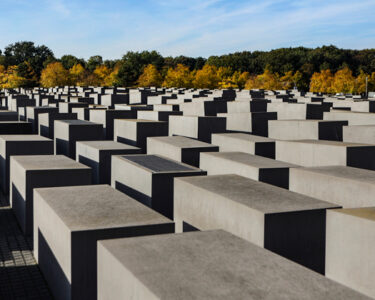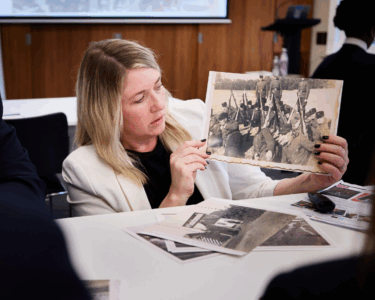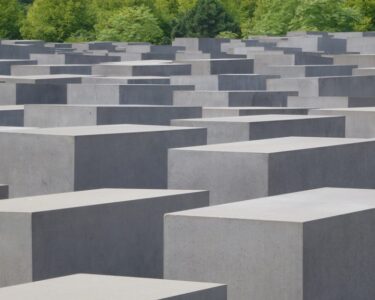For over seven years I have had the great privilege of working as a researcher at the UCL Centre for Holocaust Education. In February I packed up my desk, temporarily finishing work to commence maternity leave. Then, in the space of one week in March, I moved to a new house, had a baby, and – like everyone else in the country – went into lockdown. Throughout all this, Leon Greenman frequently came to mind.
Those of you who have participated in the teacher professional development programme designed and delivered by the UCL Centre for Holocaust Education will be familiar with Leon Greenman and his story. Leon was born in Whitechapel in East London in 1910. When the Nazis invaded the Netherlands in 1940, Leon was living in Rotterdam with his wife Else, their two-year old son Barney, and Else’s grandmother. As Nazi policy against Jewish people escalated, and increasing numbers were being deported, first to ghettos and then to death camps, Leon desperately sought to prove his British citizenship. However, he had entrusted the necessary documentation with non-Jewish friends, who subsequently destroyed the papers for fear of being caught with Jewish documents. In October 1942, Leon, Else, Barney, and Else’s grandmother were deported from their home in Rotterdam, taken first to Westerbork and then to Auschwitz. On arrival, Leon was assigned to work in the camp, but Else and Barney were taken to the gas chambers and murdered by the Nazis.
Leon was liberated by the US army in 1945, and later that year he returned to England. He began his lifetime commitment to recounting his experience of the Holocaust to groups of school pupils. In 1998 he received an OBE for his services to education.
“While in the concentration camp I made a promise to God that if I survive I would live to tell the world what took place here.”
Undoubtedly, Leon is never far from my thoughts given my role at the Centre, but the eventful week in March I mentioned earlier, really amplified this for me. The house I moved to was in Ilford. Leon lived in Ilford for many years, and it was where he was living when he died in 2008 aged 97. My colleague, Programme Director Ruth-Anne Lenga knew Leon well. She worked with him in Holocaust education for many years and became his trusted friend and carer in his latter years. She told me that Leon loved Ilford. He was well known by the residents in the area and was a staunch supporter of the local community. For example, it was important to him that he always shopped locally – supporting independent grocers and market traders. Indeed, he was so committed to supporting local businesses, that when Ruth-Anne shopped on his behalf, he would insist she did this in Ilford (despite the drive from her house in North London to Leon’s house taking her past dozens of shops and supermarkets!).
Leon was adopted by the people of Ilford as a local hero. When he died many of the residents expressed their wish to erect a permanent memorial to honour Leon’s courage and lifetime of work fighting racism. Chris Carter, editor of the local paper The Ilford Recorder, led a campaign to raise funds for the memorial, which was unveiled in the Peace Gardens situated in Ilford’s Valentine’s Park in 2009. The location of the memorial was very appropriate because Leon wanted people to live in peace and devoted his life to ensuring future generations would not have to live through the experiences he had.
The commencement of lockdown also made me reflect on Leon’s teachings. The lockdown triggered countless examples of kindness and compassion. This was especially exemplified in the sacrifices made by the country’s key workers, who repeatedly put their own health at risk in order to provide support and care for others in their community. I experienced this first-hand, just days before lockdown officially started, when my daughter was born. Despite cases of COVID-19 rapidly increasing and a palpable fear of infection, the NHS midwives continued to provide the most incredible care. For the three days I was in hospital, the midwives were steadfast in prioritising the health of my baby and I over any concerns they might have had about potential risks to their own health. With lockdown imminent, I asked the midwives how they felt about working in such challenging circumstances and they were resolute in their dedication to caring for women and their babies.
In the face of the global pandemic, their resilience, courage and kindness shone through. This was also shown by millions of key workers who continued to leave their homes and perform their jobs throughout lockdown including those working in care homes, cleaning services, the emergency services, hospitals, postal and delivery services, public transport, schools and supermarkets, to name but a few. Millions of people who provided such vital services during lockdown, risking their own health to keep their communities running and to help others during such challenging and unprecedented times.
It is this sort of positive collective action which Leon sought to embrace and promote. He spent decades inspiring young people to help others, to show courage and resilience in the face of challenge, and to stand up against injustices. This is why Leon’s story is the cornerstone of the Centre’s education programme. Giving students the opportunity to connect with Leon’s story is an important element in supporting them to gain deep knowledge and understanding about the Holocaust. Personal accounts from Leon and other Holocaust survivors who so courageously tell their stories, enables students to learn about individual experience of the Holocaust and are a critical step in ensuring that the six million Jewish victims are not treated simply as a statistic and faceless mass. I have had the privilege of running numerous focus groups with young people to find out what they have learned about the Holocaust after participating in the Centre’s education programme, and this aspect was a theme which frequently came up in discussions, for example:
“Learning more about a case study, about one person gives you more of a connection about what happened than just sort of learning that lots of people died. If you sort of look deeper into maybe one particular family or person then it sort of – you understand it more.
Year 9 student in a UCL Centre for Holocaust Education Beacon School
The importance of remembering individuals is particularly relevant now. We receive daily updates in the media about the number of deaths to COVID-19 and sadly this approach means the victims of this horrific pandemic have become a faceless mass. But as we know, every death is a tragedy and behind each statistic is a lost life and a grieving family.
I have always been in awe of the Holocaust survivors who re-visit such horrendous and painful memories each time they share their experiences with others. I also feel incredibly privileged to work with so many dedicated teachers who participate in the Centre’s education programmes and strive to deliver innovative, engaging, nuanced and sensitive curricula that enables students to develop sound knowledge and deeper understanding about the Holocaust. Students have told us that learning about this history shocks and saddens them, but also galvanises them into wanting to take positive action to help others and challenge injustice. Now that I’m a parent, my gratitude to Leon and all the Holocaust survivors who work in education, has taken on a whole new dimension. I’m also extremely thankful that when my daughter is old enough to learn about the Holocaust, we have incredible teachers who will support her in learning about this challenging, perturbing and complex subject.
By Becky Hale



